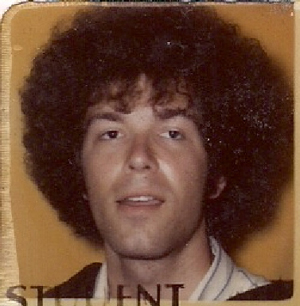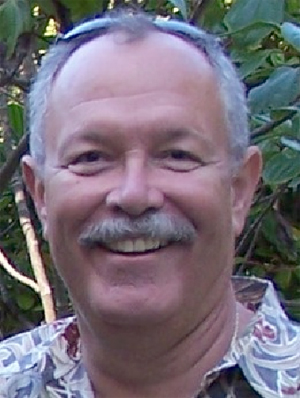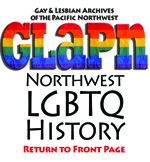Speech at "Organizing for Social Justice"
A History of the Portland LGBTQ Movement
Thoughts for 10/24/2013 PSU presentation
by Steve Fulmer
Follow this link to read more about Steve Fulmer.
My name is Steve Fulmer. It is truly a pleasure to be participating this evening with such an august panel! It is rare to be able to take a look at the past 40-plus years from the perspective of sexual minority rights.
My primary contributions took place in the 80’s and 90’s, but I was certainly present and active in the 70’s, as well. Not surprisingly I changed right along with in times, becoming the retired walrus you see now!
 But in the 1970’s I was a student here at PSU – a skinny hippy in my 20’s with a huge afro. When I arrived here in 1972, I quickly connected with the local Gay Liberation Front and PSU’s Gay Student Alliance. Within six months, I found myself co-chairing the young PSU group which was immediately renamed the Gay AND LESBIAN Student Alliance. Thanks largely to lesbians who befriended me, I immersed myself in Women’s Studies and Black Studies, and was greatly impressed by four writers – Simone de Beauvoir, Bayard Rustin (collected writings), Carl Whitman (Gay Manifesto) and Dennis Altman (Homosexual Oppression and Liberation). GLSA’s office in the student activities center was next to those of the Women’s Union and the Black student group and we learned much from them.
But in the 1970’s I was a student here at PSU – a skinny hippy in my 20’s with a huge afro. When I arrived here in 1972, I quickly connected with the local Gay Liberation Front and PSU’s Gay Student Alliance. Within six months, I found myself co-chairing the young PSU group which was immediately renamed the Gay AND LESBIAN Student Alliance. Thanks largely to lesbians who befriended me, I immersed myself in Women’s Studies and Black Studies, and was greatly impressed by four writers – Simone de Beauvoir, Bayard Rustin (collected writings), Carl Whitman (Gay Manifesto) and Dennis Altman (Homosexual Oppression and Liberation). GLSA’s office in the student activities center was next to those of the Women’s Union and the Black student group and we learned much from them.
In retrospect I now realize that what we had in the mid-70’s here was a microcosm of what was happening all across America. Bear in mind that MLK’s famous March on Washington was in August of ’63. Cesar Chavez formed the United Farm Workers in ’66, and the second wave of feminism resulted in the founding of NOW in the same year. The first anti-war March in Nov ’65 with 30,000 demonstrators swelled to 600k by late ’69! Youth across America were questioning everything in the Counter-Culture craze, and by the mid-70’s women were holding huge music festivals in the heartland of Illinois, Michigan and Ohio.
I know that it is popular to date the so-called Gay Lib moment to the Stonewall Riots in NYC in 1969, but it is very important in my opinion to understand the cultural backdrop that led to what really proved to be the Gay Rights movement in the 1970’s.
I’ll come back to this theme in a moment, but first I’ll give you a snapshot of what was happening in Portland in the early 1970’s. Here on campus we were disrupting sex education classes (we called it zapping) which were still teaching that homosexuals were “maladaptive”, getting the most egregious professor to resign. We picketed the new film “Boys in the Band” because we felt its portrayals were depressing and stereotypical. We sponsored discussion groups as alternatives to the bars and spoke in any area classroom that would have us.
 In greater Portland, I was involved with the Second Foundation which formed as a middle-ground between the radical socialism of the GLF and what was then a very conservative Imperial Court. Second Foundation offered social alternatives for youth and elders outside the bars and the court system, and began publishing The Fountain, Portland’s first newspaper by and for sexual minority people. They led the way toward creating what we now know as an actual COMMUNITY of sexual minority people. They backed an amazing one-man army named George Nicola who got the first gay rights bill introduced in the Oregon Legislature. I was one of George’s few side-kicks who lobbied the bill to within a single vote
In greater Portland, I was involved with the Second Foundation which formed as a middle-ground between the radical socialism of the GLF and what was then a very conservative Imperial Court. Second Foundation offered social alternatives for youth and elders outside the bars and the court system, and began publishing The Fountain, Portland’s first newspaper by and for sexual minority people. They led the way toward creating what we now know as an actual COMMUNITY of sexual minority people. They backed an amazing one-man army named George Nicola who got the first gay rights bill introduced in the Oregon Legislature. I was one of George’s few side-kicks who lobbied the bill to within a single vote
[Commentary] VISIBILITY is fundamental to all non-violent civil disobedience. And IMHO it was the large anti-war marches in Portland that really gave us the most visibility, because for the first time sexual minority people marched together as a contingent, proudly declaring our identity in public. It wasn’t until 1976 that Portland had its first Gay Parade and Rally, at first characterized by protest which eventually turned into the celebrations of PRIDE that we have today.
It took all of these things, African-American protest, Latino protest, women’s protest, the counter culture and the anti-Vietnam War movement to really create the environment for sexual minority people to unite and fight for our own recognition as equal members of society.
[Commentary] I also want to stress another vital contributor, because of the lesson it teaches us. That contributor, my friends, was the complacency of the homophobic establishment which was very slow to react to our initial efforts in the 1970’s. I mention it now, knowing that they soon did react, grew strong and even today maintain control of the Republican Party nationwide. The lesson for us today, having won some measure of equality in Oregon and elsewhere, is that we must NEVER take our rights for granted; we, ourselves, must never grow complacent, or the ‘ayatollah’s’ of the right will surely seek to return us to hiding in fear.
Before I move on to a quick summary of the 80’s, I’d like to bring attention to another small but extraordinary force in those days, one which reminded me of the power of music, because, you see, I was also a ‘choral activist’. I witnessed the impact of folks like Peter, Paul and Mary, Joan Baez, and Arlo Guthrie on the anti-war effort. Later, in the ‘80’s, I would gain much credit as founding President of the Portland Gay Men’s Chorus. (The importance of the Chorus cannot be underestimated - not only as a cultural contributor, but as a nearly unassailable political force.) But the FIRST sexual minority singing group in Portland was not PGMC. In the early 70’s I had the great good fortune of singing in a small faggot-assisted dyke choir, called Ursa Minor, led by Naomi Littlebear, then Kristan Knapp’s partner. [Commentary] The work of Ursa Minor influenced formation of the Dyketones and complimented street theater groups like The Family Circus (ask Judith Rizzio). I mention Ursa Minor tonight to underscore their influence on my own political development and that of many others.
In the 80’s and 90’s, I went on to help found Cascade AIDS Project, PPS’ Sexual Minority Task Force, and the Equity Foundation, and to serve in a variety of other human rights and human services organizations in Multnomah County. I’d like to stress one more factor of our success in the 80’s and 90’s. I do not believe that we could be where we are today without the horrors of the HIV epidemic. Quite simply, a silver lining of those hellish years was that it forced so many people ‘out of the closet.’ It brought VISIBILITY on a very human level that we had never had before. Average Americans realized that their boxboy, their minister, their favorite movie star were gay. The early epidemic, in effect, was our WAR fought in the headlines of America
[Commentary] So my closing comment to you, and especially to past, current or aspiring activists who may be present tonight, is to never forget, even in your moments of greatest challenge or fatigue, that what you do to advance the humanity of others will have great effects – even though you may be unaware of those effects at the time. I would never have done what I did without the inspiration of people like George Nicola and Kristin Knapp. So, on dark days NEVER think that you are failing to progress. For it may be your influence on others, even more than the battles of today, which will eventually bring about desperately needed changes in our city, our region, our nation or our planet. For I truly believe that what we do on behalf of others always makes a difference.
P.O. Box 3646 • Portland, OR 97208-3646 • info@glapn.or
Copyright © 2013

